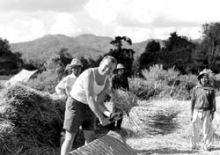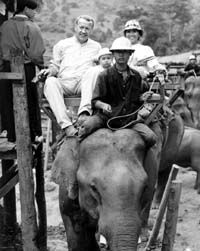The elephants moved slowly, negotiating a pass in Thailand, like tanks headed for the depot, almost out of fuel. They did not want to move any quicker. It was their habitual pace. They were free! The deeply tanned drivers did not force them. They understood each other better than we can among ourselves.
The elephants, content with such understanding, peacefully followed the rocky path. With every step of their dry legs the passengers seated in the comfortable baskets were brought closer to the point of destination.
Actually, reaching any point is just an illusion of motion, often regarded by man as progress. Not all are capable of reaching a superior goal. Well, except for Moses who stubbornly led his people across the desert for forty years, until the weak had died and a new powerful generation had grown. Nothing like that in Ukraine, because any purposeful movement becomes tedious soon and yet another domestic Moses is overthrown, followed by catcalls, to be replaced by another one. However, this will be possible until the polity turns into a desert. Then they will act quicker selecting another Moses.
Dissatisfaction with such progress came to a boy by the name of Mykola Slavutych from afar, more at the intuitive level. He was born in 1950, at the capital of Soviet Ukraine. His father Petro was from Uzhgorod and mother Antonina had persuaded him to move to Kyiv. They lived at a one-story house in Podil. The boy would run among talkative pensioners. Eventually, he graduated from the electromechanics department of Kyiv Polytechnic Institute and worked at the capital’s semiconductors factory Mayak. He had talent and before long his designs became known outside Ukraine. He started cooperating with the Baltic states, Moscow, Leningrad, and then people in Japan got interested. He worked there in 1977-79, helping Poland in between. Real luck came his way in 1980. After arriving in Japan he was offered a lucrative long-term contract with the US military-industrial complex. He wanted to play fair, so he wrote to the Soviet embassy and then left for permanent residence in the United States. His exploration of the strange world began in San Francisco and he found that the filthy lucre was not as filthy as portrayed [by Soviet propaganda]. Later, he was promoted and transferred to Connecticut. He spent the last years of the contract with the military at a base out of New York.
“Years passed in research. I was a senior research assistant with the Defense Department. We worked on a military contract and it paid off in every respect. In the end I spent 50% of my time on research projects and 50% on management. The latter meant that the harder the task assigned the harder I had to think. Especially after we made use of the part of Philips we bought in Hamburg; as the famous company got into time trouble financially and we took advantage of the situation. And then I suddenly discovered I didn’t want research or management. I realized that all those human technological tasks, military bases, nuclear power plants, and megawatts had their limits. They were rather toys for the inquisitive mind than something serious. You got tired of them and thought up new ones. You’ve never had a Ferrari, then you can afford it, you buy it. It means the world to you, and then you see it’s just another can stuffed with all kinds of contrivances. So I took a step away from everything and asked myself, What’s all this for? Is it worth making a career to send a bulldozer to ruin the banks of a lake where birds are singing so beautifully and fish is swimming, huddling to the bank. Abruptly I turned away from the zombifying financial prosperity orientation. I understood that answers to my questions are not to be found in science, but in the metaphysical, spiritual realm.”
Mykola Slavutych read books and then went to different churches with an open heart. He stayed at a Buddhist monastery in Burma the longest, for half a year. Countries changed like huge stage settings. Europe, Southeast Asia, Australia, New Zealand, Canada, Africa, China, Nepal. A very short stay in Israel to glimpse Judaism.
“But I was oppressed by the final conclusion,” he shrugs. “None of the religions answered all my questions. All religions essentially have one task: keeping man away from sin, leading him to salvation, closer to the Lord. Belief in Him is the main part of the doctrine, with verbal constructions floating around. I compared all religions to housewives. Some cook a delicious borsch, but their cutlets are overdone. Others make excellent cutlets, but their borsch is - well, I won’t use the word, because we are talking religions.”
He believes that religions were philosophic systems wishing from the outset to preserve themselves philosophically and to survive, developing their self-defenses. Subsequently, as everything else made by man, religions became overgrown with bureaucratic attributes, with the outward characteristics (rituals, setting, buildings, clothing) dominating the Truth, the Lord, losing the initial concept.
In the Philippines, he married a local beauty by the name of Floriza. They had a son. Following his father behest, they came to Ukraine in 1995 and settled in Uzhgorod. Then they had two daughters. That year was fateful. As they moved in they passed a bazaar packed with fresh mushrooms. They smelled of a healthy land.
From then on Uzhgorod has been their home town.
As the rest of the world.
* * *
Mykola Slavutych has a Ph.D. in physics and technology. He defended his doctorate in the United States. Studied the principles of employing the unnecessary dispelling of electrons in nanalithographic processes (introducing small geometries in integrated circuits). He made that unnecessary dispelling work in the right direction. As a result, electrobeam installations’ service life was prolonged by 10-15 years.
Yet his happiest memory is this:
“I saw the purest and deepest eyes in Nepal, by the Chinese border. They have no electric bulbs; they don’t want television and outer space. They look happy. A Nepalese walking in the Himalayas with a 50 kg sack of salt on his shoulder, wearing nothing but a loincloth. Walking equally fast up or down the mountain. The sky is not heavy on his shoulders, just the sack... Same with us, the salt of the earth, sitting on those elephants, basking in their great freedom. The Lord was with us!”








